新生代英语基础教程2unit6_电子教案
新一代大学英语综合教程2 教师用书-U6
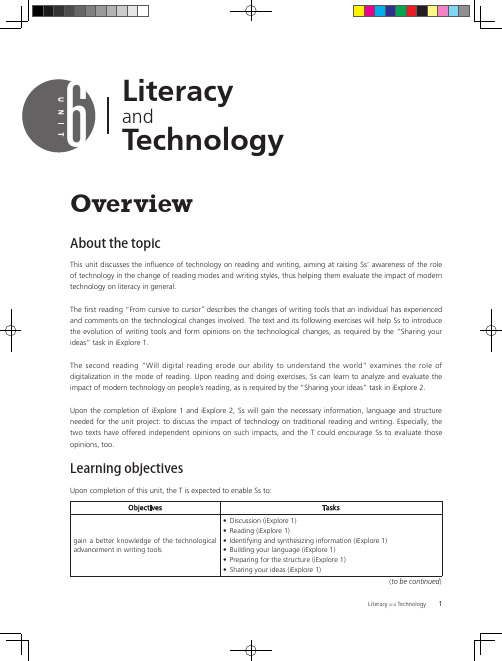
The before-class activities (Discussion & Viewing) are to prepare Ss with necessary information for the reading material and could be done by Ss themselves. If times allows, preview check and discussion could be done in class.
The after-class tasks are to be done as homework. If time allows, the T could ask Ss to present their work in class. Otherwise, Ss could upload their work and do peer-review online.
• Reading (iExplore 2) • Identifying and synthesizing information (iExplore 2) • Building your language (iExplore 2)
• Sharing your ideas (iExplore 1 & 2) • Unit project
大学英语基础教程(北大修订版)教案第二册Unit Six
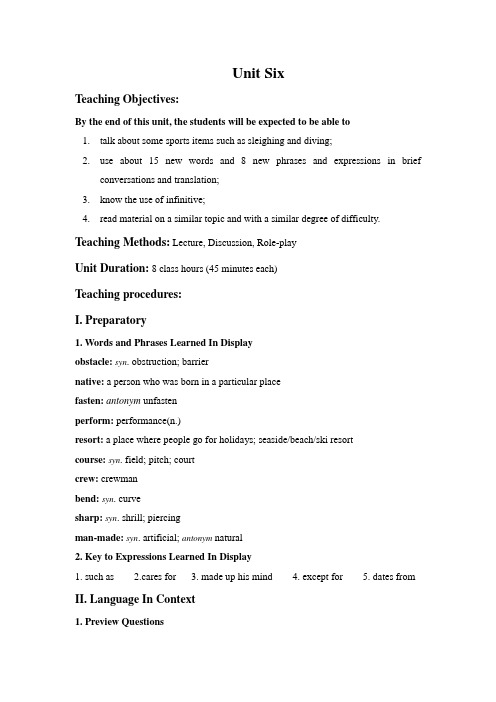
Unit SixTeaching Objectives:By the end of this unit, the students will be expected to be able to1.talk about some sports items such as sleighing and diving;e about 15 new words and 8 new phrases and expressions in briefconversations and translation;3.know the use of infinitive;4.read material on a similar topic and with a similar degree of difficulty. Teaching Methods: Lecture, Discussion, Role-playUnit Duration: 8 class hours (45 minutes each)Teaching procedures:I. Preparatory1. Words and Phrases Learned In Displayobstacle: syn. obstruction; barriernative: a person who was born in a particular placefasten:antonym unfastenperform: performance(n.)resort: a place where people go for holidays; seaside/beach/ski resortcourse:syn. field; pitch; courtcrew: crewmanbend:syn. curvesharp:syn. shrill; piercingman-made:syn. artificial; antonym natural2. Key to Expressions Learned In Display1. such as2.cares for3. made up his mind4. except for5. dates from II. Language In Context1. Preview Questionsi.Do you have any favorite sports? What are they? Why?ii.Please list some sports that require two players.iii.Can you name any favorite Chinese or international sports players?Keys for reference:① there are various answers according to the individuals. The following expressions may be of assistance.Basketball is one of my favorite sports. I like watching NBA because it not only brings entertainment to the inspectors, but I have learnt the importance of teamwork.②Sports that require two players include badminton, table tennis, tennis, fencing, chess, judo, wrestling and so on.③ My favorite sports players are Yao ming, Beckham, Iverson, Liu Xiang, Lang Ping, Luo Xuejuan, and Schumacher. Of the many sports players, I like Liu Xiang best. After he won the gold medal in 110 meter hurdles at 2004 Olympic Games, Liu Xiang became the idol in my heart. He is worth the title of “the person who moves Chinese in 2004”.2. Information Related To The Texti.EskimosAny member of a group of peoples who, with the closely related Aleut, constitute the chief element in the native population of the Arctic and sub-Arctic regions of Greenland, Alaska, Canada, and far eastern Russia.Self-designations vary among the languages and dialects of the Eskimo peoples.They include such names as Inuit, Inupiat, Yupik, and Alutiit, each of which is a regional variant of “the people” or the “real people.” The oldest known Eskimoculture is that from a site on Umnak Island in the Aleutians, for which an age of 3,018 (plus or minus 230) years was recorded. In the late 20th century there were an estimated 17,000 self-described Eskimo: some 51,000 in Greenland and Denmark, 43,000 in Alaska, 21,000 in Canada, and about 1,6000 in Siberia.Traditional Eskimo culture was totally adapted to an extremely cold, snow-and icebound environment in which vegetable foods were almost nonexistent , trees were scarce, and caribou , seal, walrus, and whale meat, and fish were the major food sources. Dogsleds were the basic means of transport on land. Eskimo clothing was fashioned of caribou furs, which provided protection against the extreme cold. In summer many Eskimos lived in animal-skin tents. Their basic social and economic unit was the nuclear family, and their religion was animistic.ii. HollandHistorical region of the Netherlands, divided since 1840 into the provinces of Noord-holland (north Holland) and Zuid-holland). It constitutes the flat, low-lying northwestern portion of the modern country.Holland originated in the early 12th century as a fief of Holy Roman Empire and was ruled by a dynasty of counts that traced its origin to the 9th century. These nobles had reemerged in the 10th century after Viking devastation of the coastal area had ended, and they proceeded to expand their territory of present Noord-Holland northward, at the expense of the Frisians, and eastward and southward, which involved them in a series of wars with the bishops of Utrecht.The name Holland was derived from the region around Dordrecht, which was known as Holtland(“wooden land”).3. Language Points1. Many sports began as ways to overcome obstacles.obstacle n. thing in the way that either stops progress or makes it difficulte.g. Not being able to pass his mathematics exam proved an obstacle to his career.2. Natives of northern countries such as Lapps, Finns, and Eskimos were the first experts in sleighing and sledding.native n.1) person born in a place, country, ect, and associated with it by birthe.g. a native of London, Wales and India.2) local inhabitante.g. when we’re on holiday in Greece, we live like the natives.3. Eskimos raced across frozen ground at breakneck speedbreakneck adj. dangerously faste.g. drive, ride, travel, ect at breakneck speede.g. a football pitch illuminated with floodlights4. Sleighing by boats dates from the seventeenth century.date back to/from have existed sincee.g. This castle dates from the 14th century.Our partnership dated back to 1960.5. The Dutch made up their minds to sail their boats with runners fastened beneath the bow, or front, a boat became a sleigh.Make up one’s mind come to a decisione.g. I’ve made up my mind to be a doctor.Have you made up your mind where to go for your holiday?6. The riders, except for the driver, bend backward.Except (for sb./sth.) not including (sb./sth.); but note.g. The restaurant is open every day except Monday.I can answer all the questions except for the last.She remembered nothing (about him) except that his hair was black.7.It is simply a board bound to two well-oiled runners.bind v. tie or fasten, e.g. with ropee.g. they bound his legs so he couldn’t escape.He was bound to a chair and left.8. Sleighs still perform the same task.Perform v.1) do (a piece of work, something. One is ordered to do, something. One has agreed to do)e.g. perform an operation to save his life2) act (a play), play (a piece of music) or to do tricks to entertain an audiencee.g. they are performing his piano concerto tonight.III. Toward Productive LanguageLanguage Points1. For two years, not once did she clamber onto a board.clamber v. climb, esp. with difficulty or effort , using the hands and feete.g. The children clambered over the rock.2. Fu joined the diving camps at age 7 and was shipped off to a Beijing sports schoola couple of years latership sb./sth. off send sb. awaye.g. the children had been shipped off to a boarding-school at an early age.3. Occasionally they would come to diving meets in her native Hubei province, and would scan the audience from the platform trying to locate them.occasionally adv. now and then; at timese.g. he visits me occasionally.4. In January, less than a year after she re-emerged, her crisp dives captured a silver medal at the Diving World Cupcapture v.1) take or win (sth.) by force or skille.g. capture a town2) take (sb./sth) as a prisonere.g. capture an escaped convictthis advertisement will capture the attention of TV audiences.IV. Homework1.Dictation of the new words;2.More grammar exercises(present participles);3.Translation (from Chinese to English)1)英语不是我们的母语。
《新时代高职英语(基础模块)2》教案第6课

《新时代高职英语(基础模块)2》电子教案【教师】让学生看图片与表达(详见教材),将图片与表达进行搭配【学生】看、思考、搭配【教师】检查练习的答案【学生】学习、理解、记忆【教师】解释新单词和短语1 eco-friendly /ˌiːkəʊˈfrendli/ adj. 对环境无害的;环保的e.g. Eco-friendly cars are a prerequisite for the future, but there must be more than that.环保型汽车是未来汽车的先决条件,但决不能止步于此。
2 classify /'klæsɪfaɪ/ v.将……分类e.g. Men in the post office classify mail according to places it is to go.邮局里的人员将信件按寄送地点分类。
3 recycle /ˌriːˈsaɪkl/ v.回收利用e.g. Environment experts urge people to recycle plastic bags.环境专家们呼吁大家回收利用塑料袋。
4 packaging /'pækɪdʒɪŋ/ n.包装材料;外包装e.g. Attractive packaging can help to sell products.精美的包装有助于产品的销售。
5 manufacturing /ˌmænjuˈfæktʃərɪŋ/ n.制造;制造业e.g. Manufacturing industry was worst affected by the fuel shortage. 制造业受燃料短缺的影响最为严重。
【学生】学习、理解、记忆【教师】播放视频" Protecting Our Planet Starts with You",请几位学生分享他们对环保的理解【学生】观看、理解、分享【教师】给出一些有用的表达方式用来描述环保的重要性1 water pollution and air pollution 水污染和空气污染2 the greenhouse effect 温室效应3 energy conservation and emission reduction节能减排4 encourage people to go green 鼓励大众进行绿色生活5 Only through the joint efforts of government and individuals can we live in a sustainable environment.只有通过政府和个人的共同努力,我们才能实现资源环境的可持续发展。
新一代大学英语(基础篇)综合教程2第六单元
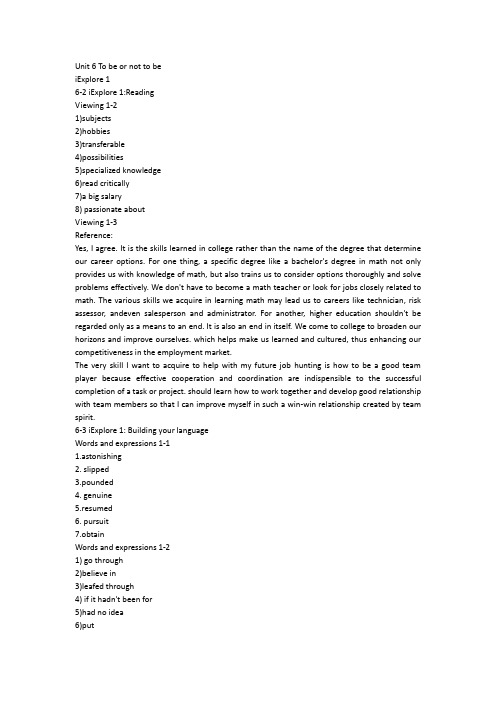
Unit 6 To be or not to beiExplore 16-2 iExplore 1:ReadingViewing 1-21)subjects2)hobbies3)transferable4)possibilities5)specialized knowledge6)read critically7)a big salary8) passionate aboutViewing 1-3Reference:Yes, I agree. It is the skills learned in college rather than the name of the degree that determine our career options. For one thing, a specific degree like a bachelor's degree in math not only provides us with knowledge of math, but also trains us to consider options thoroughly and solve problems effectively. We don't have to become a math teacher or look for jobs closely related to math. The various skills we acquire in learning math may lead us to careers like technician, risk assessor, andeven salesperson and administrator. For another, higher education shouldn't be regarded only as a means to an end. It is also an end in itself. We come to college to broaden our horizons and improve ourselves. which helps make us learned and cultured, thus enhancing our competitiveness in the employment market.The very skill I want to acquire to help with my future job hunting is how to be a good team player because effective cooperation and coordination are indispensible to the successful completion of a task or project. should learn how to work together and develop good relationship with team members so that I can improve myself in such a win-win relationship created by team spirit.6-3 iExplore 1: Building your languageWords and expressions 1-11.astonishing2. slipped3.pounded4. genuine5.resumed6. pursuit7.obtainWords and expressions 1-21) go through2)believe in3)leafed through4) if it hadn't been for5)had no idea6)put7)in touch with8)was lost in9)a variety ofCollocations 1-11.lean2.translated3.pursuit4.leaned5. need6.translate7.need8. pursuitCollocations 1-21. Reference: have an appreciation of the fine things in life2. Reference: the holiday season means more spending and more time with family3.Reference: After a brief silence4. Reference: After the graduation season5. Reference: show our appreciation to Mom who gave us our lives6.Reference: Keep absolute silenceVocabulary learning strate 1-21.shorten2.enable3.loosen4.sharpen5.enlarge6.worsen7. ensure8.endangerVocabulary learning strate 1-31.shorten2.loosened3.enlarge4.sharpen5. ensure6.enable7.endanger8.worsenedLanguage focus 1-2AABAALanguage focus 1-31. Reference: Being fully responsible for your own choice Taking full responsibility for your own choice2.Reference: After graduating from college3. Reference: allowing students to pursue their interests4. Reference: Seeing so many interviewers before herBanked cloze1)course2)convinced3)uttered4)lectured5)lost6)silence7)voice8)reverence9)pursuing10)appreciatediExplore 26-4 iExplore: ReadingViewing 1-21)research2)less3)individual4)exploration5)what you want to do6)feels rightViewing 1-3Reference:I think the first piece of advice is the most helpful and important for me. Before landing a job. the research on ourselves and on our target position is absolutely necessary. Like any choice-making, sometimes we don't really know what we want and what we already have. As a result, to examine ourselves and find out what we really want is the first step on our career path. In addition. a thorough research on potential positions is equally important. match between our needs and potential positions we are offered may well promote our personal development. IExplore 2: Building your languageWords and expressions 1-11. initial2. deliberation3.Peer4.brilliance5.preference6. minimalWords and expressions 1-21. backing up2. in3,brings about4. to be freed from5. makes sense6. put in8.was meant toCollocations 1-11.generate2.offer3. Making4.built5.follow6. drawCollocations 1-21. Reference: gave him a slight sense of autonomy2. Reference: You will feel a sense of relief You will have a sense of relief3.Reference: He felt a strong sense of fulfillment/He felt a strong sense of achievement/ He had a strong sense of fulfillment/He had strong sense of achievement4.Reference: people could not make sense of this natural phenomenon/people could not make any sense of this natural phenomenon5. Reference: gave her a sense of fulfillment /gave her a sense of achievement6. Reference: usually gives people a strong sense of security7.Reference: They have a strong sense of humorVocabulary learning strategies 1-2Translation 1-2Reference:1一旦你选择了一条道路,这一决定就意味着下一步要制定种种计划,承担各种责任。
新标准大学英语第二册Unit 6 教案

新标准大学英语综合教程第二册Unit 6 Sporting LifeMy dream comes truePredictingIdentifying features of a formal writing style through readingOrganizing Students’ oral discussion by showing them how to present information and opinionsAnalyzing trends by using patterns observed and researched athlete, born in 1972, who won the gold medal for the heptathlon at the 2000 Sydney Olympic Games. After her 2000 Olympic gold medal event, she was given an OBE, an honor given by the Queen, to recognize her contribution to sports and other championships.In the 2004 Olympic Games she had to withdraw due to injuries. She retired from sports in 2005. 2. Why is an Olympic medal prized more highly than other sports trophies? 3. Can spectators help an athlete to win?4.Is it important to support your favorite player, your teamor your country?Answer the questionsWhich phrases in the passage tell us that: 1. the race took place in the evening?2. the writer felt very nervous before the race?3. the writer had decided to use the strategy she had worked out earlier?4. the writer was going to put all her effort into the race?5. nothing except winning or losing would be important after the race?6. the writer stopped thinking about one thing and started thinking aboutsomething else?7. the writer refused to allow herself to think that she’d won?8. the writer worried that she might have lost? sudden change in movement 轻柔地;轻轻地 e.g.1. She kissed her baby gently on the cheek.她温柔地吻了吻她孩子的脸颊。
新生代英语基础教程Unit电子教案
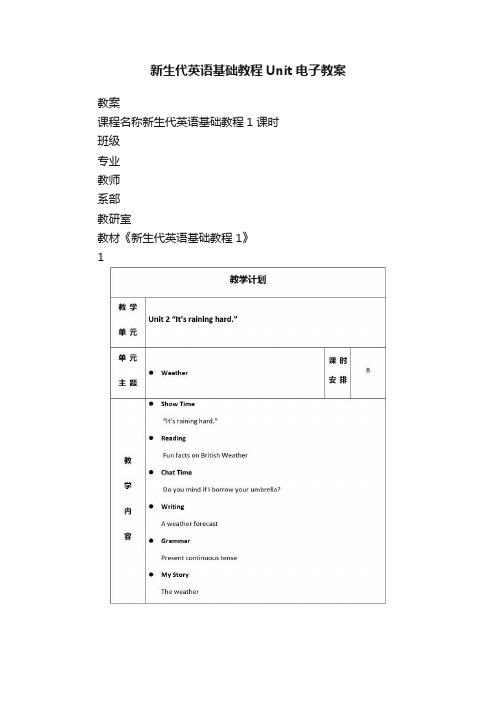
新生代英语基础教程Unit电子教案教案课程名称新生代英语基础教程1 课时班级专业教师系部教研室教材《新生代英语基础教程1》1345678补充教学资源VOCABULARY BUILDER参考译文SHOW TIME语言解析1. It’s ten after three.三点过十分了。
ten after three 三点过十分,这个短语相当于ten past three。
英语中表示“几点过几分”(半小时以内)可用after,也可用past;而表示“几点差几分”则用to,通常先讲分钟,再讲小时, 即after / past 或to前面的数字为分钟,后面的数字为小时。
e.g. 5:10 ten past five (ten after five)10:05 five past ten (five after ten)5:50 ten to six9:45 fifteen to ten2. The class is canceled because of the storm. 因为暴雨,课被取消了。
because of意思是“因为”,是一个介词短语,后面跟名词或动名词,构成介宾结构。
because是连词,后面跟句子。
9e.g. The plane didn’t take off because of the heavy rain.因为大雨,飞机没有起飞。
The plane didn’t take off because it was raining heavily.因为下大雨,飞机没有起飞。
3.Nobody came to class—except us.除了我们几个,没有人来上课了。
except 表示“除……之外”,强调所排除的“不包括在内”,一般表示同类之间的关系。
besides表示“除……以外还……”,有“不但……而且……”的意思。
e.g. The library is open every day except Mondays.除了星期一,图书馆每天都开放。
中职英语基础模块2(新课标版)教案:unit6tellmewhenthepainstarted

Unit 6 T ell me when the pain started.(第一课时教学设计)一、学情分析本单元是教材《英语2》(基础模块高教版)第六单元,主要话题为看病就医。
教师可通过本单元的听、说、读、写各种教学活动,一方面帮助学生掌握正确表达与英语学习相关的词汇与句型,另一方面引导学生结合自身的情况反思自己的英语学习,针对自身的学习问题选择有效的学习策略。
二、教材分析1. 教学内容具体内容为:有关常见疾病的名称和描述病情的句式、就医时医生和病人之间的有关的对话。
2. 教学重点、难点⑴教学重点能够听懂就医的常用语,掌握叙述病症、接受医生建议的常用表达方式。
⑵教学难点有关就医的词汇和句型。
三、教学目标1.知识目标(1)帮助学生掌握以下词汇:stomachache, toothache, fever, cough, headache, back pain, runny nose, sore throat, appointment等。
(2)帮助学生掌握就医时使用的基本句型,如:What’s wrong with you?I’ve a headache / a sore throat / a runny nose / fever / cough, ect.How long have you felt this way?I feel cold. I think I have a fever.I’d like to make an appointment with the doctor.The doctor is free at ….Will … be OK for you?Take this medicine … times a day. / Stay in bed for …. / Y ou should have a good rest.Thank you very much.四、教学步骤Step One Lead-in (7 mins)1. The teacher greets the Ss with the following sentences:How are you, boys and girls?I didn’t sleep well last night.I’ve had a cold because ….I’m not myself today.Explain I’m not myself today and get the Ss to say something about themselves. Step T wo Listening and speaking (30 mins)1. Before listening, ask the Ss to look at the picture and answer the question: What’s wrong with the boy in the picture?2. Activity 3: Listen and answer the questions.Listen to the tape and answer the questions. Listen again and then check the answers.3. Activity 4: Listen again and complete the card.4. Activity 5: Read and underline.Read aloud after the tape and then practice the dialogue in pairs. Get some pairs to act it out.Underline the sentences about illness and check in class.Step Three Summary (6 mins)Make a short summary of what we’ve learned today.(1) Useful expressions: have a stomachache / toothache / fever / cough / headache / back pain / runny nose / sore throat, make an appointment, etc.(2) Everyday English:What’s wrong with you?I’ve a headache / a sore throat / a runny nose / fever / cough, ect.How long have you felt this way?I feel cold. I think I have a fever.I’d like to make an appointment with the doctor.The doctor is free at ….Will … be OK for you?Take this medicine … times a day. / Stay in bed for …. / Y ou should have a good rest.Step Four Homework (2 mins)1. Practice the dialogue in pairs and recite it..2. Make up a dialogue with your partner.五、板书设计Unit 6 T ell me when the pain started.(第二课时教学设计)一、教材分析1. 教学内容具体内容为:阅读有关描述病人病情的小短文,填写病人病历,并根据病情编写医生和病人之间的对话;撰写英文病假条。
英语2(基础模块)(第2版)Unit 6课件精选课件
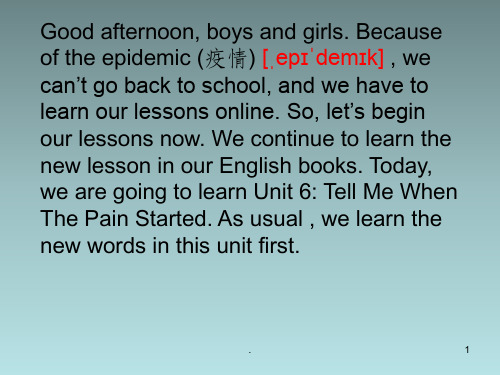
.
11
2. Listen and order.
4C
A
3B
D
The correct order: 1. __3B___ 2. __A___ 3. __D___ 4. __4C___
.
12
.
13
3. Listen and answer.
1: Who is Tom talking to? _th_e__re_c_e_p_ti_on_i_s_t _of_D_r_._S_m_i_th_’s _o_ff_ic_e_. ________________
stomachache cough
toothache headache
fever back pain
What’s the matter with him? He is coughing.
__c_o__u_g_h___
.
6
1. Look and match.
stomachache cough
toothache headache
He has back pain. .
10
• 询问某人是否不舒服时,用下列句型: • What’s the matter with him/her?或者回答 • What’s wrong with him/her?
• 回答时要注意表示病痛的词是名词还是动 词
• He/She has (a) +病痛的名词。 • He/She is 动词+ing.
fever back pain
What’s the matter with him?
He has a STOMACHACHE.
_s__to__m_a__c_h_a_c_h__e_
全新版大学英语综合教程2--第二版Unit6电子教案
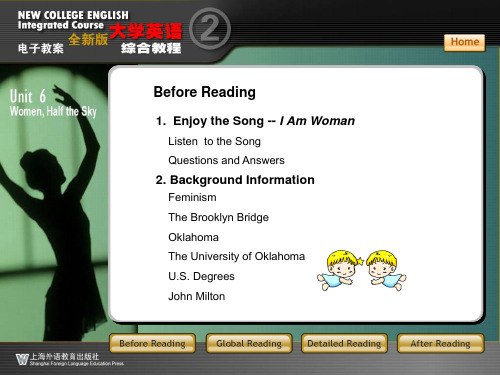
Feminism
In the 1960s feminism (=the belief that women and men are equal in abilities and should have equal rights and opportunities) became the subject of intense debate when the women’s liberation movement encouraged women to reject their traditional supporting role and to demand equal status and equal rights with men in areas such as employment and pay.
II ■
bridge, Roebling positioned the road deck 36.6m (120ft) above the water. Stone towers, which rose to a height of 84.3m (276.5ft), made this high roadway possible and made the bridge the tallest structure in New York at its completion. The span from tower to tower of just over 486m (1,595ft) and the span between cable anchors of 1,054m (3,456ft) constituted a remarkable achievement. The Brooklyn Bridge in New York City perhaps best demonstrates the scale of building made possible by the rapid expansion of American industry and by American ambition. The expression selling the Brooklyn Bridge to somebody means tricking somebody in a deal.
英语基础模块第二册Unit6教案
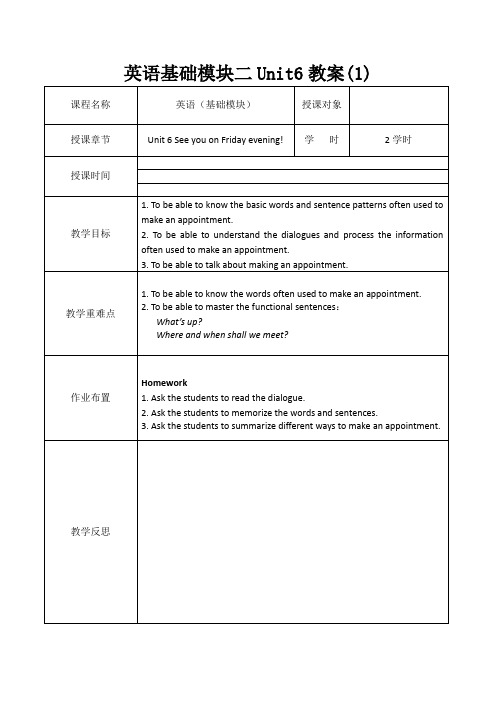
3. To be able to understand an invitationletter and write an invitation card.
教学重难点
Help the students topracticethe important readingstrategies:scanning, skimming and guessing themeaning ofunfamiliar words.
II.Present the key sentences on the slide and explain their meanings.
Read the wordson Page 57.
Show the picture of Judy and
Carl.Answer the question:
What are they going to do?
教学重难点
1.To be ableto know the wordsoften used to make anappointment.
2. To be able tomaster the functional sentences:
What’s up?
Where and when shall we meet?
2. To be able to understand the dialogues andprocesstheinformation often used to make an appointment.
3. To be able to talk aboutmaking an appointment.
英语2(基础模块)(第2版)Unit 6课件
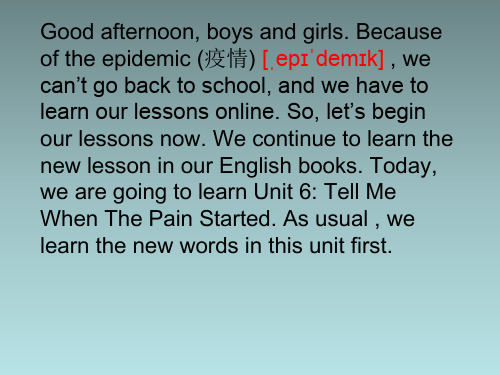
Doctor: What’s wrong with you?
Eva: I cough, and feel cold .
Doctor: How long have you felt this way?
Good afternoon, boys and girls. Because of the epidemic (疫情) [ˌepɪˈdemɪk] , we can’t go back to school, and we have to learn our lessons online. So, let’s begin our lessons now. We continue to learn the new lesson in our English books. Today, we are going to learn Unit 6: Tell Me When The Pain Started. As usual , we learn the new words in this unit first.
Appointment Report Card Tom a headache, _a__b_a_d__b_a_c_k_p_a_i_n__, hurting eyes playing computer games
Appointment time _at__3__th_i_s_a_ft_e_rn_o_o_n_______________
5. Listen and underline.
Nurse: Betty:
Nurse: Betty:
Nurse: Betty:
Good morning, Dr. King’s office. Good morning, my name is Betty and I would like to make an
英语基础模块2UNIT 6导学案
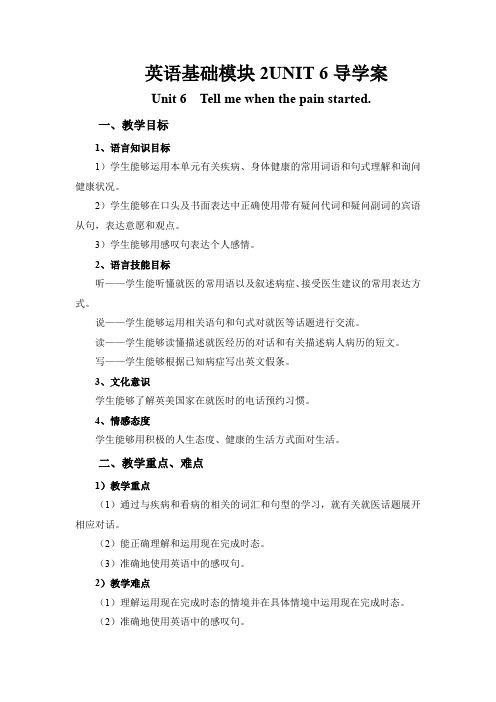
英语基础模块2UNIT 6导学案Unit 6 Tell me when the pain started.一、教学目标1、语言知识目标1)学生能够运用本单元有关疾病、身体健康的常用词语和句式理解和询问健康状况。
2)学生能够在口头及书面表达中正确使用带有疑问代词和疑问副词的宾语从句,表达意愿和观点。
3)学生能够用感叹句表达个人感情。
2、语言技能目标听——学生能听懂就医的常用语以及叙述病症、接受医生建议的常用表达方式。
说——学生能够运用相关语句和句式对就医等话题进行交流。
读——学生能够读懂描述就医经历的对话和有关描述病人病历的短文。
写——学生能够根据已知病症写出英文假条。
3、文化意识学生能够了解英美国家在就医时的电话预约习惯。
4、情感态度学生能够用积极的人生态度、健康的生活方式面对生活。
二、教学重点、难点1)教学重点(1)通过与疾病和看病的相关的词汇和句型的学习,就有关就医话题展开相应对话。
(2)能正确理解和运用现在完成时态。
(3)准确地使用英语中的感叹句。
2)教学难点(1)理解运用现在完成时态的情境并在具体情境中运用现在完成时态。
(2)准确地使用英语中的感叹句。
三、教学知识点1、看病就医常用语句1)医生询问病情的常用问句:What's wrongwith you?你怎么了?What's the matter with you? 你怎么了?What's your trouble? 你怎么了?How are you(feeling)now?你现在感觉怎么样?How long have you felt this way? 你出现这样的症状有多久了?=Hoe long have you been like this? 回答此问题时一定要用for引导时间状语。
如,---How long have you felt this way?---For a week.2)病人诉说病情的常用语句:I'm not feeling well.我感到不舒服。
新时代职业英语《 通用英语2》教学课件U6
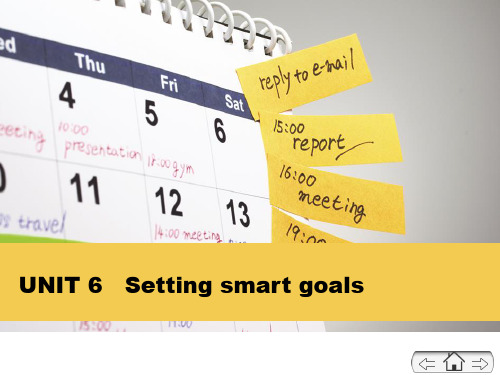
ATM是什么意思?
语言解析
2. Measuring a goal will tell you how near or far you are from completing it. 通过衡量目标,你可以知道自己离实现目标还有多近或多远。
complete:
short term 短期 E.g. In the short term, chemical sprays are clearly an
effective way to control pests. 从短期来看,喷洒化学药品显然能有效控制虫害。
words and expressions
social activity 社交活动 E.g. You should take an active part in social activities.
C Listen and complete the conversation.
Chen Shan: What are your plans for the future, Amy? Amy: Well, my short-term goal is to (1) __p_a_ss_______ all my exams at the end of this semester. Chen Shan: Me too! But recently I’ve started to think of long-term goals. You know, I really want to get a good (2) __d_e_g_r_e_e____ . Amy: I’ve been thinking about that too. Outstanding (3) _g_r_a_d_u_a_t_e_s__ have much wider opportunities to choose from. Chen Shan: That’s true. A good degree also means you have a chance of getting a(n) (4) __in_t_e_rn______ position after graduation. Amy: We shouldn’t just think about career goals though. (5) R__e_la_t_io_n_s_h_ip_s_ are also important. Chen Shan: You’re right. But first I want to feel satisfied with where my career is going.
英语基础模块第二册Unit6教案

教学内容及环节
教学活动及时间分配
【组织教学】
1.起立、师生相互问候;
2.考勤、集中学生注意力。
【导入新课】
Free talkto lead in.
【展示学习目标】
1. To be able to know thebasic words andsentence patternsoften used to makeanappointment.
Who will attend the meeting?
Who will give a presentation?
III. Ask the students to listen to the dialogue in Activity again and then fill in the form according to the dialogue.
教学反思
教学内容及环节
教学活动及时间分配
【组织教学】
1.起立、师生相互问候;
2.考勤、集中学生注意力。
【导入新课】
Ask and answer.
【展示学习目标】
1. To be able to read and understand a passage with proper reading strategies:scanning,skimming and guessingthe meaningof unfamiliar words.
Practice the dialoguቤተ መጻሕፍቲ ባይዱ.
Learn thebasic sentences.
What’s up?
When and where shall we meet?
How about…?
新生代英语高级教程2+Unit+6_电子教案

教案课程名称新生代英语高级教程2 课时班级专业教师系部教研室教材《新生代英语高级教程2》1515151515151515补充教学资源Vocabulary Builder参考译文男:我有跟你说我的新爱好吗?女:没有,是什么?男:我开始对摄影感兴趣了。
女:摄影?什么类型的?男:其实,我喜欢给食物拍照片。
女:食物?听着有些无聊。
男:不!其实这非常酷。
我去餐馆给我点的食物拍照。
然后我把照片发布在我的博客上,并点评这些食物。
女:哦,所以这些照片是用来写餐馆评论。
有点意思……博客叫什么名字?男:叫作“吃喝在纽约”。
你可以用谷歌搜索一下。
女:我会的!期待看你发布的文章。
15Show Time参考译文娜奥米:好了,让我们准备开始吧。
赫克托:这游戏叫什么名字来着?娜奥米:叫“神奇高手”。
这儿有三个类别的问题:美国地理、美国政府和历史上的重大时刻。
赫克托:游戏规则是怎样的?娜奥米:非常简单。
我们轮流回答问题。
回答正确的参与者得一分。
玛特奥:好的,让我们先从地理开始,因为这是我的长项。
娜奥米:好,听第一题。
位于国家中心的是哪个州:亚利桑那州、科罗拉多州还是堪萨斯州?赫克托:我知道——嗯……是科罗拉多州?玛特奥:科罗拉多州和亚利桑那州都位于西南部。
所以肯定是堪萨斯州。
娜奥米:一点儿没错,玛特奥!堪萨斯州位于美国中部。
它所在的地区称为中西部地区。
赫克托:这我知道。
你只是运气好,玛特奥。
玛特奥:别嫉妒,朋友。
我生来聪明。
那么,选手们,接下来你们选择哪个类别?赫克托:来试试美国历史吧。
玛特奥:好。
这个问题不错:在美国历史最悠久的城市是哪个?娜奥米:我知道!玛特奥:说说看。
娜奥米:我想答案肯定是纽约。
纽约是美国规模最大且历史最悠久的城市。
玛特奥:你呢,赫克托?15赫克托:我不同意。
我认为波士顿是美国历史最悠久的城市。
玛特奥:真遗憾,你俩都错了。
美国历史最悠久城市既不是纽约也不是波士顿。
娜奥米:那答案是什么?玛特奥:美国历史最悠久的城市是圣奥古斯丁,在佛罗里达州。
《英语基础教程》第二册word版电子教案 Book 2 Unit 6 教案 Book2Unit6-2

Unit 6 Tell me how long have you been like this.〔第二课时教学设计〕一、教材分析1.教学内容本课时系教材?英语根底教程?〔2〕第六单元的第二课时,包括Reading and writing 局部,具体内容为:能读懂关于以健康为主题的文章;简单描绘睡眠问题并给出改善睡眠的建议;同时了解根本的保健知识,了解并有意识的培养健康的饮食、生活方式,养成积极健康的生活习惯。
2.教学重点、难点⑴教学重点掌握重点词汇和短语;学生能通过阅读,读懂有关睡眠的相关知识,提取改善睡眠的方法,提高获取相关大意和细节信息的能力;培养学生阅读并整合信息的能力,而且能读以致用,通过阅读能写出改良健康睡眠建议的小短文。
⑵教学难点灵活正确使用重点词汇和短语;能根据关键句型写出改善睡眠的小文段。
二、教学目标1.知识目标⑴理解并掌握关于睡眠介绍的相关词汇,如:anxious, avoid, nap, regulate, solution, have difficulty in, write down⑵掌握描述旅行活动的句型,如:... do not have good sleep.You have difficulty in falling sleep,keeping through the night, or waking up too early…When you can’t fall asleep….regulate your body clock....2.能力目标⑴能看懂睡眠问题和解决方案;⑵能写出改善睡眠的小文段。
3.情感目标⑴能够关注自己的睡眠状况;⑵用积极的人生态度、健康的生活方式面对生活三、教学步骤Step One Lead-in1.Revision:Have the students to speak out the common symptoms as much as possible.〔设计意图:通过列举病症,翻译卡片,帮助学生激活旧知,为后面熟练准确的运用做好准备。
最新版创新高职英语基础教程实用2册精品电子教案unit 6 Yes, High Technology, but Wait!Part B

B2 Read.
Deteriorating sleep patterns
Back pain
Headache
Hearing problems
B2 Read.
Eye problems
Neck strain/injury Laziness & Obesity
Knee pain
Carpal tunnel syndrome (腕管综合征)
B1 Look and say.
Telephone was replaced by Mobile phone Television is getting thinner . Meanwhile people are getting bigger
Instead of waiting nervously for the phoneห้องสมุดไป่ตู้call, people nowadays can contact with each other on Twitter or QQ in front of the computer.
B2 Read. Read
The Social Problems Being Caused by TECHNOLOGY
Lead-in activity Guided reading After-reading reflection Resources
B2 Read.
Lead-in activity Questions for discussion (open): 1. Among the following ways of communication, which one do you prefer? Why?
B2 Read.
【教学设计】Module 2 Unit 6
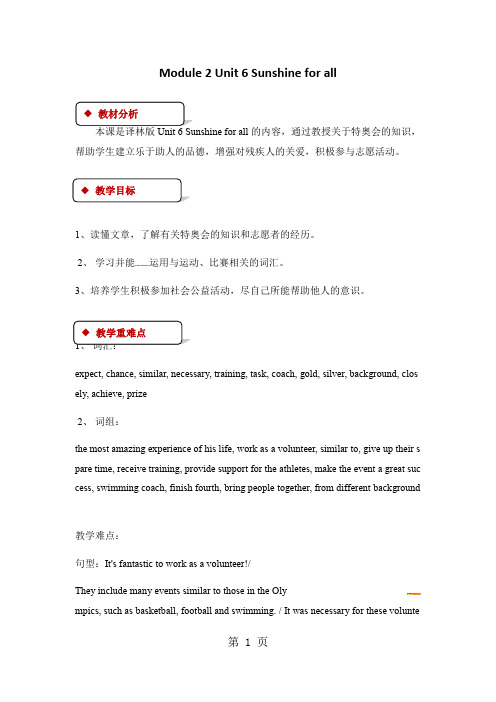
Module 2 Unit 6 Sunshine for all的内容,通过教授关于特奥会的知识,帮助学生建立乐于助人的品德,增强对残疾人的关爱,积极参与志愿活动。
1、读懂文章,了解有关特奥会的知识和志愿者的经历。
2、学习并能运用与运动、比赛相关的词汇。
3、培养学生积极参加社会公益活动,尽自己所能帮助他人的意识。
expect,chance,similar,necessary,training,task,coach,gold,silver,background,clos ely,achieve,prize2、词组:the most amazing experience of his life,work as a volunteer,similar to,give up their s pare time,receive training,provide support for the athletes,make the event a great suc cess,swimming coach,finish fourth,bring people together,from different background教学难点:句型:It's fantastic to work as a volunteer!/They include many events similar to those in the Olympics,such as basketball,football and swimming./It was necessary for these volunteers to receive training before doing the tasks.多媒体课件、录音机、教学素材1.Free talkHave you ever been a volunteer?Have you ever helpe d people who need help?2.Amy and Daniel are talking about people who need help. Listen to the recording and answer the following question:How can we help homeless people?3.Work in pairs and discuss the people in Part A.Use the conversation below as a model.4.Would Eddie and Hobo like to help people in need?5.Listen and answer the questions:What is Hobo doing?Will Eddie support him?How does Hobo want Eddie to help?nguage points7.ExercisesStep2. Reading1.Words study2.Free talk:How can we help people with intellectual disabilities?We can volunteer for the Special Olympics World Games.Have you heard this event?Can you tell me something about it?拓展:the Special Olympics World Games世界特殊奥运会世界特殊奥运会是一个为全世界智力缺陷儿童及成年人提供体育训练和比赛的国际体育运动民间团体。
- 1、下载文档前请自行甄别文档内容的完整性,平台不提供额外的编辑、内容补充、找答案等附加服务。
- 2、"仅部分预览"的文档,不可在线预览部分如存在完整性等问题,可反馈申请退款(可完整预览的文档不适用该条件!)。
- 3、如文档侵犯您的权益,请联系客服反馈,我们会尽快为您处理(人工客服工作时间:9:00-18:30)。
教案课程名称新生代英语基础教程2课时____________________班级____________________专业____________________教师____________________系部____________________教研室____________________教材《新生代英语基础教程2》Staying healthyShow Time“You’d better call the doctor.”ReadingDo you know these home remedies? Chat TimeAt the drugstoreWritingText messagesGrammargerund / infinitiveMy StoryStaying healthymain Have students look at the picture and ask them to tell you something about it as much as they can.Then, go through the questions and complete each answer. In addition, you can ask a few warm-up questions such as “How often do you go to theHave the students listen and repeat the words. For the definitions, start by teaching the physical symptoms (dizzy, cough, fever, ache, etc.). You can show these by acting them out. Then say a word and have a student act out the symptom. Tell students that the word ache can be applied to head, stomach, tooth or back.After the warm-up, students have already know the word thermometer. You may also introduce the word temperature, and say “We use a thermometer to take our temperature.” (This is also introducing the infinitive to take.) For painkillers, you can explain that there are many different brands of these. Ask students to tell you some well-known painkiller brands. Once students are comfortable with the new words, let them do the exercises, correcting any mistakes. For the word infection, you can explain the meaning and then ask students what causes and prevents infections. For example, if you cut yourself, cleaning the wound and using a bandage can prevent infection. YouTell the students they will hear a conversation between Jason and his doctor. Then listen to the conversation and have students complete the sentences. Correct any mistakes. For more vocabulary related to the doctor, see Useful Links.For Exercise D, first review the vocabulary words about different diseases like cough, fever, etc. Then let students select one disease and describe its symptom. You can set up an example by saying “if I have a fever, I feel very hot ….” Then let students read each clue of the diseases, and predict their names. The fastest student wins.First, have the students watch the video in its entirety. Ask basic comprehension questions such as, “Who are the main characters in this video?” “Where are they?” “What are they doing?” “Why are they doing that?” “How are they doing it?”Next, have students take turns explaining what is happening in each picture. You can make an example with the first picture, and then have a more confident student tryWatch the video. Then look at Exercise B, and ask students to check Mr. Sanchez’s symptoms.Next, students can complete the dialogue in Exercise C. Have a group of students read out the dialogue with one student playing the role of Mrs. Sanchez, one as the doctor, one as Mr. Sanchez and the other as Hector.For an extension activity, you can also have students rewrite the conversation, using different names. To check the answers for Exercises B, C, and D, students can exchange books and listen as you go through the answers.If you would like to assign homework, you can tell students that they must rewrite every incorrect answer 5, 10 or 20 times at your discretion.routine Explain to students the meaning of routine checkup. Then, ask students how often they have a routine checkup or when their last checkup was.Before reading, have students brainstorm some things that mighthappen in a routine checkup.Next, read and listen to the text and have the students read each of the True/False statements and choose the correct answer. For more information about medical checkup, see Useful Links.Put students in pairs and have them practice talking about medical checkups. Every two minutes have students stand up and change partners. Do this three or four times, depending on class size.For Exercise D, let students think about is there any home remedy for a slight cold. Then encourage them to do the exercise to learn more about some other home remedies and check the answers.Explain to students that they will hear a conversation in which a customer is talking to a pharmacist at the drugstore. Introduce the key vocabulary words for this conversation.Tell the students to listen carefully and write down what they hear in the blank spaces. If necessary, pause the recording so that students have time to write.Next, have students practice talking about health, monitoring them while they do so.Now, have students read throughLanguage Note, teaching the idiom once in a blue moon. Ask students some things that they do once in a blue moon. For example, “I go abroad once in a blue moon.” A game you can play with this is every student writes a once in a blue moon sentence on a piece of paper. Then you put all the papers into a hat and read them out one by one. Have the class guess who wrote each sentence.For Exercise C, review some basic expressions and sentences about seeing a doctor. Then have students work in pairs and do a role-play. One acts as the patient and the other the doctor. Walk around the class and provide students with some guidance. When time is up, invite some good “actors” to perform in front of the class.Have students read the dialog in pairs and guess the meaning of abbreviations and phrases. Check their work.Work in pairs and complete the conversation between A and B. Try to use abbreviations where possible. Have volunteers demonstrate their conversation.Start by explaining to students what gerunds and infinitives are. It’s important that the students understand the basic concept –that gerunds and infinitives change verbs into nouns. The best way to dothis is to give some examples. Start with subject sentences, for example “Swimming is good exercise for your muscles.” or “To swim is good exercise for your muscles.” (Obviously, the gerund form is more commonly used here, but both are grammatically correct.) Tell students that in this sentence, swimming is the name of an activity, and is thus a noun.Have students make their own examples and write them on the board.Then, tell students that when gerunds and infinitives are objects, they are used after certain verbs. Write the lists on the board and drill them to help students memorize them. One way to do this is to have students read them out loud and then erase a word. Students must read them all out loud, including the word you erased (you point to a blank space).In the end, the whole board will be blank and students will be reading out the words from memory. This may take some time but is worth it to help students remember.Finish by having students complete the exercises, and then ask them to exchange books and go through the answers, correcting any mistakes. For more information and extra activities related to gerunds and infinitives, see Useful Links on.Tell the students that they willwatch a video in which real peopletalk about their health.Then watch the video and havestudents complete the true or falsestatements. In some cases, you mayneed to pause the video to help thestudents.Next have students tell you theanswers, correcting any mistakes.Watch the video again and havestudents fill in the missing words,pausing the video if necessary.Check the students’ answers,correcting any mistakes.For the discussion section, give thestudents your answers to thequestions. Next, you can haveseveral students give their answersto the class. Finally, have thestudents discuss the questions inpairs and/or in groups.Finish all the exercises in Unit 6.Read the text in this unit again andtry to summarise its content.Write text messages with your partnerabout your health conditions, usingabbreviations.补充教学资源VOCABULARY BUILDER参考译文医生:杰森,该轮到你做检查了。
